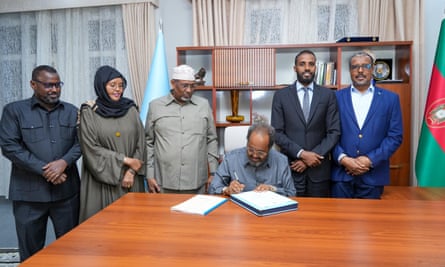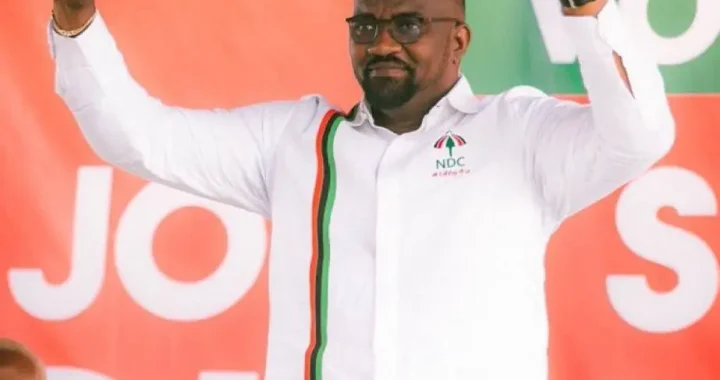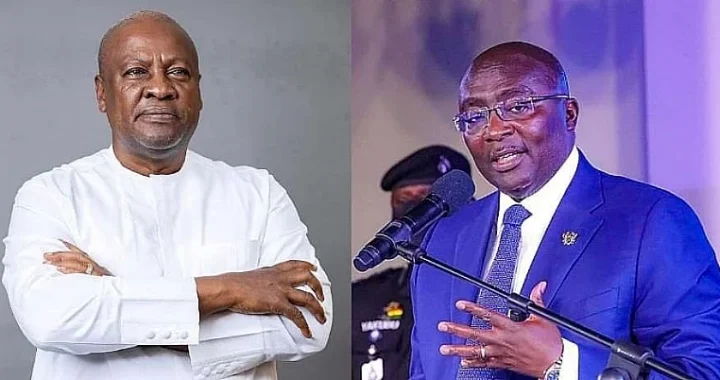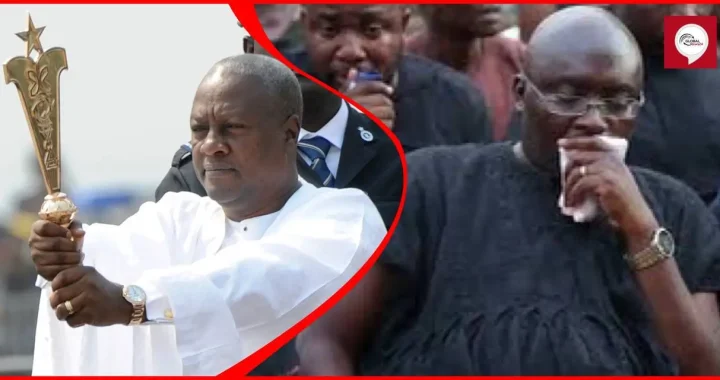Violence Concerns Rise as Somalia Abandons Power-sharing

Growing concerns over violence arise as Somalia abandons its power-sharing mechanism. The semi-autonomous region of Puntland declines to acknowledge alterations made to the nation’s delicate constitution and has withdrawn from the federal system.
A revision of Somalia’s constitution that eliminates the power-sharing system and gives the president greater authority is posing a threat to the fragile nation. According to the information minister from the semi-autonomous state of Puntland, the most prosperous and stable state in Somalia refuses to acknowledge these modifications, thereby exacerbated the potential for violence. Mohamud Aidid Dirir expressed his apprehension to The Guardian, stating that the new constitution was enacted without the involvement of the state’s leaders. He accused President Hassan Sheikh Mohamud of concentrating authority through parliament.
Last weekend, Somali lawmakers overwhelmingly approved numerous constitutional amendments. These amendments will reshape the political and electoral system, giving the president more power. The move has been praised as ‘historic’ by parliamentary speaker Adan Mohamed Nuur Madobe.
The amendments authorize the president to appoint and dismiss prime ministers, transferring this authority from lawmakers. Additionally, the president will have increased control over appointments to the electoral commission, reducing input from federal states. The present power-sharing model, which guarantees equal representation for the country’s four principal clans in parliament, will be replaced by universal suffrage.
ALSO READ: SA Parliament Speaker Resigns over Bribery Corruption Allegations
Dirir expressed concern about the concentration of power in one person’s hands, especially in a country still recovering from a civil war and lacking stable politics. He warned that such a concentrated power could potentially lead to a return to civil war. Dirir further criticized President Hassan for taking power away from parliament and the states. He claimed that he now holds multiple positions within the government.
Dirir claimed that Puntland encountered obstacles when attempting to participate in consultations. As a result, the region is unwilling to recognize the constitutional changes. While Puntland is not declaring independence, it will continue to assert its autonomy.
Puntland, one of Somalia’s five federal states, was established as a separate self-governing entity in 1998, and is the country’s most powerful regional administration.

Dirir said concentrating authority in Mogadishu “threatens national unity”. “Our government is federal, which means powers are divided,” he said.
Somalia experienced the collapse of its central government in 1991, leading to a devastating civil war exacerbated by the emergence of the extremist group al-Shabaab in the mid-2000s. The ongoing conflict between militants and the military, coupled with years of drought due to failed rains, has resulted in the displacement of millions of people. Currently, approximately 6.9 million individuals are in urgent need of humanitarian assistance.
Afyare A Elmi, a research professor at the City University of Mogadishu, expressed concerns that Puntland’s withdrawal from the federal system could further jeopardize the unity of Somalia as a nation.
ALSO READ: 2024 Senegal presidential election: Millions vote in hotly contested polls
The federal states of Jubbaland, South West state, Hirshabelle, and Galmudug have not yet provided any comments on the proposed amendments. Somaliland, which declared independence from Somalia in 1991, stated that the recent constitutional developments in Somalia are an internal matter.
Former presidents Mohamed Abdullahi Farmaajo and Sharif Ahmed cautioned that the changes could disrupt Somalia’s fragile power dynamics, while former prime ministers Omar Sharmarke and Hassan Ali Khaire, along with veteran MP Abdirahman Abdishakur, criticized the amendments in an open letter.
Version 1: The current constitution of Somalia was implemented in 2012, but it was meant to be a temporary document and has been under review for a long time. President Mohamud made a promise during the 2022 elections to create a new constitution. He recently emphasized that further delays are not acceptable, stating, “We are not a provisional government, but we have a provisional constitution.”
Omar Mahmoud, an analyst specializing in East Africa at the International Crisis Group, wrote that resolving fundamental issues regarding the federal model is crucial for Somalia’s governance system to function more effectively and overcome recurring challenges in their relations between Mogadishu and Garowe (the capital of Puntland). However, without dialogue between the parties, achieving this goal becomes impossible, allowing the current situation to persist indefinitely. Growing concerns over violence in Somalia as Puntland abandons from power-sharing mechanism.
 2024 Election Live Results: Former President Mahama Wins Election; Dr. Bawumia Concedes Defeat
2024 Election Live Results: Former President Mahama Wins Election; Dr. Bawumia Concedes Defeat  2024 Election Live Results: John Dumelo In Comfortable LEAD As Mahama Projected To Win
2024 Election Live Results: John Dumelo In Comfortable LEAD As Mahama Projected To Win  2024 Election Live Results: Provisional Results So Far; 5 Parliamentary Projections Declared
2024 Election Live Results: Provisional Results So Far; 5 Parliamentary Projections Declared  Election 2024: John Mahama Predicted To Win With 52.2%, Bawumia Trails With 41.4% – Full Report
Election 2024: John Mahama Predicted To Win With 52.2%, Bawumia Trails With 41.4% – Full Report  2024 Election in Ghana: Symbolic Meaning of NDC’s No. 8 on the Ballot Paper
2024 Election in Ghana: Symbolic Meaning of NDC’s No. 8 on the Ballot Paper  It is POSSIBLE NPP will lose the 2024 Election
It is POSSIBLE NPP will lose the 2024 Election  Accurate Football Predictions For Today, Saturday 8th March 2025
Accurate Football Predictions For Today, Saturday 8th March 2025  Champions League Predicted Correct Scores For Today, 5th March 2025
Champions League Predicted Correct Scores For Today, 5th March 2025